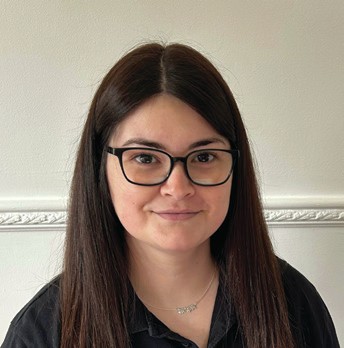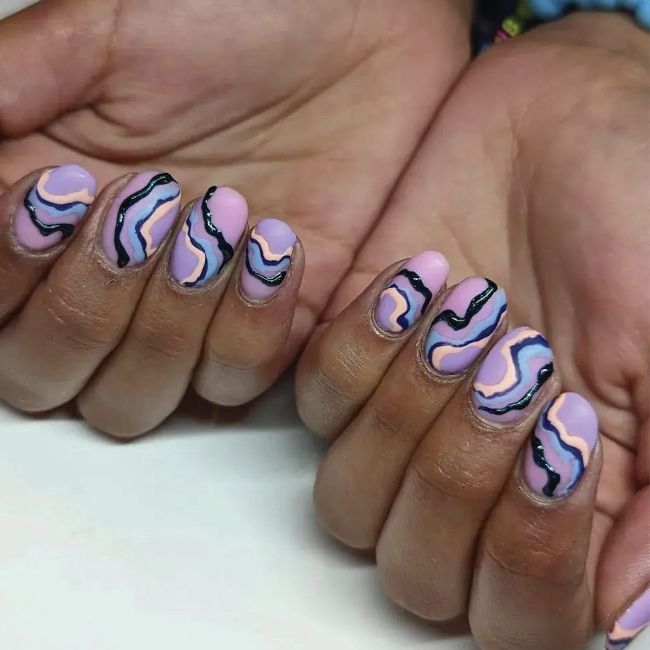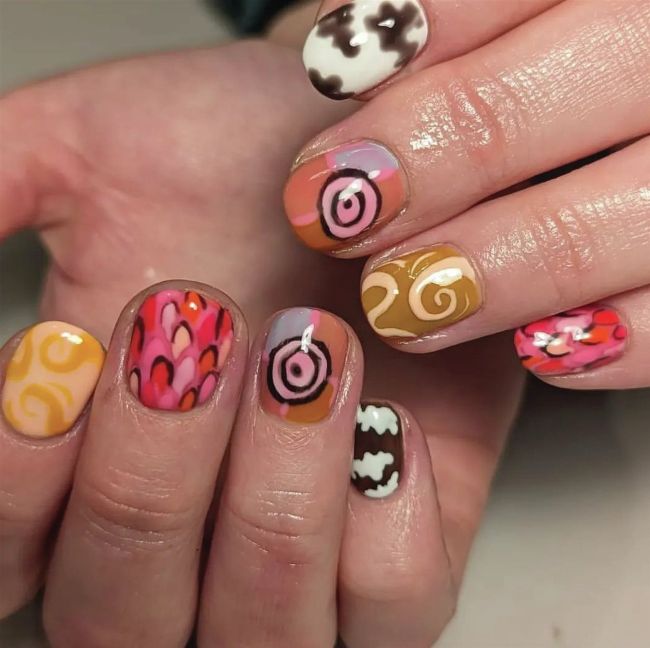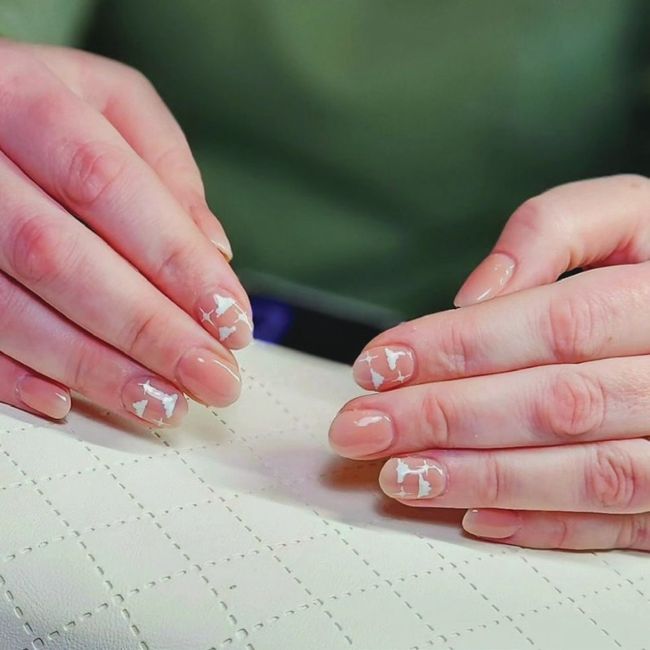INDUSTRY INCLUSIVITY
Helping HANDS
Three trailblazing nail techs share how they manage chronic health conditions & disabilities & Scratch serves up notes for employers & pros CALLIE ILEY REPORTS
I
f you have a physical or mental impairment that has a substantial and long-term negative effect on your ability to do daily activities, you are ‘disabled’ under the Equality Act 2010. This Act covers persons in England, Scotland and Wales, and sets out personal characteristics that are protected by the law, as well as behaviour that is unlawful.
Defining disability
According to www.gov.uk, a substantial impairment is one that is more than minor or trivial, such as taking a long time to complete a task like getting dressed. A long-term impairment is one lasting 12 months or more, such as asthma and diabetes, and fluctuating or progressive conditions, such as rheumatoid arthritis or motor neurone disease.
A mental impairment includes mental health conditions (such as bipolar disorder or depression), learning difficulties (such as dyslexia) and learning disabilities (such as autism and Down’s syndrome). The definition of disability under the Equality Act 2010 is automatically met from the day a person is diagnosed with HIV infection, cancer or multiple sclerosis.

Rachel Drazdoviene
Navigating challenges
Rachel Drazdoviene was diagnosed with temporal lobe epilepsy in 2017. “I was seizure-free for around three years until the birth of my third son Rachel Drazdoviene in 2020, when I began having daily seizures and was forced to stop working,” she shares. After doctors found a medication that worked for her, stopping the seizures, Rachel decided to get back into work. In December 2022, she took her first steps into the beauty industry, which gave her flexibility around her family life.
“A long-term impairment is one lasting 12 months or more, such as asthma and diabetes, and fluctuating or progressive conditions such as rheumatoid arthritis or motor neurone disease.”
Argyll-based charitable enterprise, InspirAlba, supported Rachel on her employment journey, funding an ABT-recognised nail course in Glasgow. However the steps into her career weren’t without challenges. “Glasgow is three hours away from my home, so I was really nervous about the course, as I had never travelled anywhere alone and was undergoing several health problems,” Rachel shares. “I considered cancelling several times due to anxieties about my health, but I completed the course. It was a huge confidence boost and pushed me to undertake a beauty qualification at college.”
Rachel’s client base stretches from family and friends to residents local to her, in Connel, Scotland. Trading under ScarraBeauty, she accepts appointments that work around her health needs, studies and caring for her children.
Last year, Rachel was diagnosed with immune thrombocytopenic purpura, a bleeding disorder potentially caused by her epilepsy medication. “I’m also in the process of a lupus diagnosis, and have considered stopping work altogether, but I want to overcome my conditions and not let them get the better of me,” she reveals.
Rachel shares her condition with clients, noting the importance of keeping them aware in case she needs to move or cancel an appointment. “My epilepsy and medication cause me to be forgetful, so I have to be very careful to ensure I follow each step of the nail procedure correctly,” she notes. “I follow a tick sheet for each step and only book in two clients each week, as I can suffer from dizzy spells when concentrating on nail art designs. I have had to rearrange clients, which makes me feel guilty, but my conditions lead to burnout and soreness. I try not to take on more than I can handle and I rest in between clients, who are very understanding.”
Nailing disability
Rachel is an active member of the Nailing Disabilities Facebook page, which was set up in January by Yasmin Hodge of Wolverhampton nail business, Gels By Yas. Yasmin experiences pain in her hands, wrists, shoulders, chest, back and legs daily, which means she can see up to four clients on a good day, or just one when the pain is worse. She created the group so that techs with disabilities or health challenges can support one another and breed confidence as they navigate working with their conditions.

Yasmin Hodge
“The group is not just for these nail techs, but for the wider industry, so that there is greater awareness of the barriers and struggles that are faced daily,” Yasmin says. “I want to foster a positive environment for professionals to celebrate their achievements, share advice and support one another during challenging times.”
Nailing Disabilities accrued over 500 members in the three weeks since its launch. “I joined and don’t feel so alone anymore,” shares Rachel. “It’s a safe space to share personal struggles and ask for advice, as members are understanding and can relate, and I don’t feel judged or embarrassed. It has also helped raise awareness of conditions I was unfamiliar with.”
“I have received so many messages from those within the industry who have wanted a safe environment to talk about their challenges and have found that in the group,” adds Yasmin. “I hope it continues to grow and help people to feel safe to discuss any struggles they might encounter within our community.”
Yasmin needs to take regular breaks throughout her work day, and has made adjustments such as using a higher wrist rest to ease upper body strain, working with an E-file to reduce stress on her hands and wrists, and swapping from cuticle nippers to scissors to reduce pressure on her fingers. She has experienced difficulties in finding a job within a salon and renting a space. “I have always been honest about my disabilities and that they are the reason why I seek part-time work,” she says. “This has led to resistance from employers, as some have simply not contacted me, and others have said they don’t think it is worthwhile employing a part-time nail tech.
“There is room for every nail technician in the industry, as we all bring something different to the table.”
“I would never not want to be doing nails,” Yasmin reveals. “It can be difficult being a nail technician with health conditions, but we are as good as those without, even if it takes us a little longer.”

Nails by Abi Hassan.

Abi Hassan
Adaptations & thoughts
“Disability and accessibility isn’t just the responsibility of the disabled person, but of those around them and society as a whole,” notes Abi Hassan, inclusivity and accessibility advocate & owner of Hot Wheels Nails in Canterbury, Kent. “In the context of the nail industry, it is the responsibility of salon owners, business owners and nail techs to reflect on accessibility within their individual workspaces for both salon staff and clients.”
Abi struggled to navigate the beginnings of her business, with her health fluctuations meaning adaptations were required. “As a disabled person, I often questioned the feasibility of nail tekking as a career,” she reflects. “I have experienced the inaccessibility of the world generally and didn’t feel confident in the likelihood of my success as a professional nail technician. I was able, with the help and support of others, to use the skills I had developed in managing my disability and navigating a mostly inaccessible society to my advantage. I have a nail desk on wheels, a trolley containing my products also on wheels, and have found a way to keep everything in reach.
“As my confidence grew, I began to use social media to promote my work, and I’m sure a lot of nail techs can relate to how exhausting that can be. I now schedule my content and allocate specific time in my diary for this, which reduces how overwhelming it can be. I often find myself comparing my capacity to other techs I connect with, which is something that can hold me back. I have become aware of a sense of hustle culture within the beauty industry, and see other techs and beauticians working themselves beyond capacity to ‘keep up’ with what can feel like a saturated space,” Abi continues.
“I have found reprieve in connecting with fellow techs who have been honest about their experiences and what they have learned. One of my main takeaways has been that there is room for every nail technician in the industry, as we all bring something different to the table. That has given me the confidence to use my personal experiences and knowledge surrounding accessibility to provide accessible and inclusive nail treatments to clients with a range of access needs.”
#FABFOLLOW
Rachel Drazdoviene @scarrabeauty
Yasmin Hodge @gelsbyyas
Abi Hassan @hotwheelsnails
Client considerations
Abi Hassan shares insights on accommodating clients with accessibility needs...
“When speaking to my clients about accessibility needs, 89% have, at least once, had to reconsider or cancel treatments due to lack of accessibility. All of them reported facing difficulties accessing beauty treatments because of a lack of physical accessibility, sensory difficulties and anxiety,” Abi reveals. “I complete a consultation at the point of booking to ensure I am prepared and can adapt the appointment appropriately, in turn speeding up the service and making the client feel at ease. Open conversations like this are so important for creating accessible salon spaces.
“Transparency around any difficulties that disabled clients might experience in the salon is so valuable, such as physical access barriers: steps, door widths and toilets, and factors that can affect invisible disabilities,” she notes. “Support clients and employees where possible, and be honest when support is challenging. There is never a one-size-fits-all solution, so be guided by clients as to their individual needs when reflecting on difficulties that might be faced.
“My clients have suggested a disclaimer on a website or Instagram, stating you welcome disabled and neurodiverse people and are open to adapting to their needs. Also state if you allow clients to move around and take breaks as needed, can play quiet background music (or let the client choose) and offer silent appointments as an option. Inform clients of quiet and busy times and if you allow a second person to their appointment.”
Access To Work
UK Government initiative, Access To Work, can help you get or stay in work if you have a physical or mental health condition or disability. It does not matter how much you earn. If you get an Access To Work grant, it will not affect any other benefits you receive and you will not have to pay it back. You or your employer may need to pay some costs up front and claim them back later.
The support yyou get depends on your needs, and you can apply for:
• A grant to help pay for practical support with your work. This includes adaptations to your vehicle so you can get to work, the costs of travelling to work if you cannot use public transport, and physical changes to your workplace. Your workplace can include your home if you have a home salon, or work from there some or all of the time.
• Support with managing your mental health at work. This may include a tailored plan to help you get or stay in work, or one-to-one sessions with a mental health professional.
• Money to pay for communication support at job interviews. Access To Work can help pay for communication support at a job interview if you are deaf or hard of hearing and need a BSL interpreter or lipspeaker, or if you have a physical or mental health condition or learning difficulty and need communication support.
To check your eligibility for an Access To Work grant and to apply, visit www.gov.uk/access-to-work

Nails by Abi Hassan.
Disability rights
It is against the law to discriminate against anyone with a disability, and if you are disabled, you have the same rights as other workers, protected under the Equality Act 2010. According to www.gov.uk, employers should make ‘reasonable adjustments’ to help disabled employees and job applicants with:
• Application forms, for example providing forms in braille or audio formats.
• Aptitude tests, for example giving extra time to complete the tests.
• Dismissal or redundancy.
• Discipline and grievances.
• Interview arrangements, such as providing wheelchair access and communicator support.
• Making sure the workplace has the right facilities and equipment for disabled workers or someone offered a job.
• Promotion, transfer and training opportunities.
• Terms of employment, including pay.
• Work-related benefits like access to recreation or refreshment facilities.
If you think you’ve been unfairly discriminated against in the workplace, you should first talk to your employer to try and rectify the problem informally. If the problem continues, talk to Acas or Citizens Advice, which can offer mediation services and support. You may be able to take a claim to a court or tribunal for discrimination.
“By showcasing successful examples of disabled individuals excelling in their craft and businesses making efforts to accommodate where possible, the industry becomes a catalyst for challenging stereotypes and breaking down preconceived notions.”
Notes for employers
“Accessibility needs and requirements do not only apply to clients – it is also important to consider the ways your business can support disabled colleagues,” shares Abi. “When speaking with employed nail technicians with accessibility requirements, less than 20% had support from their employers to ensure their accessibility needs were met. The remaining nail techs had to solve any difficulties around their access needs alone, without support from their employer or any other organisation.”
If you are advertising a job vacancy in your beauty business, you must not exclude disabled people from applying, however some jobs may have an essential requirement that cannot be met with a reasonable adjustment. If you reject a disabled candidate, it must be based on their performance at interview rather than the fact you have to make reasonable adjustments.
“As a salon owner, it is incredibly beneficial to have open conversations and regular check-ins with your team to ensure their needs are being met and that invisible disabilities are not being unintentionally ignored,” Abi continues. “Businesses that champion diversity are opening their doors to a wider pool of talented nail technicians, and are also more likely to attract a broader clientele, reflecting the work put in to support their disabled employees.”
The UK Government website details the considerations that must be made at all stages of the employment process:
Application
You cannot ask questions about disability and health on an application form or during an interview before the offer of a job has been made, unless it relates to an intrinsic part of the job. You also can’t reject a disabled candidate just because they’re disabled, as that would be unlawful disability discrimination. You need to be sure that they can’t do the job before you reject them on that basis.
The interview stage
You can ask a job applicant relevant questions about their disability and health before you interview them, if and when you interview and before deciding whether to give them a job, in order to find out whether they can do something essential to the job. You can also ask a job applicant about their disability and health, if you want to:
• Find out whether they are able to take part in the application/selection process or need special arrangements or assistance (reasonable adjustments).
• Monitor the diversity of applicants for jobs you advertise.
• Support positive action for disabled people.
• Recruit a person with a particular disability.
• Vet them for reasons relating to national security.
The offer
Once you have offered someone a job, you can ask unlimited questions about their disability and health, including questions about sick records. You can make the job offer conditional on the answers to these questions, providing it is reasonable to do so given the nature of the job. Once a job offer has been issued, this can also be made conditional on passing a medical.
Future thoughts
“All of the nail techs I surveyed said that they have not had any disability awareness training, but have a desire to, and 40% of these techs are unsure of who to speak to about accessibility needs,” Abi reveals. “A further 20% reported only having a rough idea. As an employer, educating staff members on disability and accessibility is beneficial.
“Creating an inclusive space within the nail industry for both clients and salon staff contributes to changing societal perceptions of disability,” Abi continues. “By showcasing successful examples of disabled individuals excelling in their craft and businesses making efforts to accommodate where possible, the industry becomes a catalyst for challenging stereotypes and breaking down preconceived notions. This not only fosters a sense of empowerment among disabled individuals, but prompts a broader societal shift towards recognising and appreciating diverse talents.”
“Businesses that champion diversity are opening their doors to a wider pool of talented nail technicians, and are also more likely to attract a broader clientele, reflecting the work put in to support their disabled employees.”

Nails by Rachel Drazdoviene.